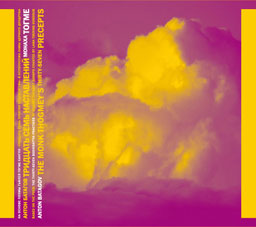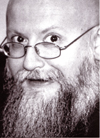


 |
 |
 |
|
|
|
|
|
|
 Anton Batagov
Anton BatagovThe Monk Thogmey's Thirty-Seven Precepts based on the poem The Thirty-Seven Bodhisattva Practices by Gyalsey Thogmey Zangpo chanted by Lama Tsering Dondrub chanting: Lama Tsering Dondrub piano, organ: A.B. vibraphone, percussion: Peteris Shuniatis guitar: Theophrastus bass: Peter Wood cello: Nikita Kochergin recording: XMZ, A.B. mixing, editing, mastering: A.B. artwork: Nick Shtok executive producer: Ludmila Dmitrieva written and recorded in the spring of 2005 (c) 2007 Tummo (c)(p) 2007 Long Arms Records CDLA 07087 The Tibetan monk, yogi and philosopher Gyalsey Thogmey Zangpo (1285-1369) was renowned for his vast knowledge and high spiritual realizations. He wrote more than a hundred texts clarifying the teachings of the Buddha and spent many years in retreats and meditation. When disciples listened to him, tears streamed down their faces. Resolving to compose a brief and lucid teaching that could be understood by the unsophisticated layman, he composed The Thirty-Seven Bodhisattva Practices, a didactic poem setting forth the main tenets of the Bodhisattva Path—the essence of the Mahayana teachings. This poem, written in the fourteenth century, remains one of the best known and most popular works of Tibetan Buddhist literature. For almost seven hundred years it has been a source of inspiration for those entering the path of the Dharma. These teachings are truly timeless and universal. Alexander Nariniani. From the preface to the Russian edition of The Thirty-Seven Bodhisattva Practices The Sanskrit word bodhisattva refers to a person who sees the relief of others’ suffering as the sole meaning of human existence. A bodhisattva is a human being who has achieved such a high degree of control over mind and body that he can easily do what an ordinary person can only dream of. It isn’t any more difficult for a bodhisattva to transport himself between distant points in time and space than it is to switch TV channels. What is more, he is able to escape from the cycle of rebirth that is called samsara. And that’s exactly what all such people would do, regarding it as the triumphant end of their spiritual path, if they didn’t have boundless compassion. A bodhisattva finds it impossible to enjoy the bliss of a personal nirvana while billions of creatures are still being born, suffering, and dying. Instead of going “up” immediately upon his physical death, a bodhisattva does the opposite: he “falls down” to samsara, being born again and again and choosing the times and places for rebirth that will bring maximum benefit to other beings. From a “normal” perspective (that of an egoist who lives only for his or her own welfare), a bodhisattva’s way of life, motivation, and deeds looks a lot like insanity. Some, however, make this model of behavior their compass in life. No, it is not their dream to master unaided flight, read minds, predict the future, or perform other “commercial miracles”. They simply have the energy of compassion that is dormant in everyone’s heart. One day this energy awakens, and a person finds himself or herself on the bodhisattva path. Thogmey Zangpo addresses his precepts to these people. When I first thought about writing a composition based on The Thirty-Seven Bodhisattva Practices, I decided to have a recording of the complete poem performed in traditional manner, and use this recording as a vocal track. In the Tibetan tradition, sacred texts are chanted without any written notation, and the principles of chanting are transmitted from guru to disciple. I asked Lama Tsering Dondrub, who has been giving a series of teachings in Moscow with detailed line-by-line commentaries on this text, to do the studio recording. He kindly agreed, and his performance—marvelously expressive and radiant with energy—became the central element of my “musical commentary”. In my composition, each verse is preceded by an instrumental passage. These instrumental sections have their own line of development, independent from that of the verses. For this reason, the music runs in two parallel layers: the first is a meditative sound structure that does not discriminate between happiness and suffering, joy and sorrow; the second is a distant echo of early Seventies rock music in which all these human emotions are condensed to a single point and amplified like a ray of sunlight by a magnifying glass. The two layers intersect time and again, because the perfection attained by a bodhisattva in his meditation is not a goal but a jumping-off point for a leap into the abyss called “life”—repeated over and over until samsara is emptied. Anton Batagov, May 2005 (English translation by A.B. edited by Carl Copeland) |
|
|

World premiere of complete work February 18, 2009 London Royal Festival Hall, United Kingdom Vladimir MARTYNOV, Opera VITA NUOVA More Info The Monk Thogmey's Thirty-Seven Precepts - new disk of Anton Batagov is released More Info The 1st International Festival of Joint Projects "Amplitude" 25th, 28th of September More Info LONG ARMS FEST- 4 (2007) September 27-30, October 6-27 -- FOURTH presentation of the MAIN INTERNATIONAL VANGUARD FORUM OF TWO CAPITALS -- LONG ARMS in Moscow and APOSITION FORUM in St. Petersburg. More Info 10 April, 2007, concert In memory of Nick DMITRIEV Dom Cultural Center more info 13, 14 of November, 2006 Moscow Composers Orchestra on London Jazz Festival More Info LONG ARMS FESTIVAL - 3 September 27 - October 4, Moscow, 2006 DOM Cultural Centre More Info 8, 9, 10 of July 2006 the play "Mozart and Salieri. Requiem" by Vladimir Martynov music. 14, 16, 17 of July the play "Song XXIII. Interment of Patrokl. Games" by Vladimir Martynov music More Info 10th of April, 2006 Nick, we remember you... A film about Nick Dmitriev is now available for download. The film was shown in 2004 on Russian Channel TV Culture DivX (300 mb) download now 23d of November - 2nd of December, 2005 5 performances of "Unorthodox Chants" Project in UK and Belgium More Info 17th-19th of November, 2005 Festival in Tokyo in memory of Nick Dmitriev More Info 1st-10th of October 2005, Long Arms Festival - 2 in memory of Nick Dmitriev see website 1st of July, 2004, 19:00 OPUS POSTH Ensemble performs THE SEVEN LAST WORDS OF OUR SAVIOUR ON THE CROSS by Joseph Haydn Kozitsky lane., house 5 metro Puschkinskaya, Tverskaya, Chekhovskaya information - 299-2262 LONG ARMS new music festival in memory of Nick Dmitriev  from May 15 till 19 IN CONCERT STUDIO M.Nikitskaya str., 24 organized by DEVOTIO MODERNA CENTER and RADIO CULTURE GTRK composers Martynov, Batagov, Karmanov, Aigi, Zagny, Pelecis, Rabinovich, Semzo, Glass, Dresher and others performers Tatiana Grindenko, Galina Muradova, OPUS POSTH ensemble, Anton Batagov, Sergei Zagny, Alexey Aigi, 4.33 ensemble, Tibor Semzo, GORDIAN KNOT ensemble, ALKONOST choir and others book tickets |
|
Intro
Personalities
Institution
Projects
CDs Production
Press
Contacts
Subscription
Links
(C) 2004 Äåâîöèî Ìîäåðíà, admin@devotiomoderna.ru |
|
|